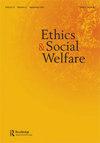档案、认识不公与认识过去
IF 0.7
Q4 SOCIAL WORK
引用次数: 1
摘要
摘要在本文中,我认为档案的销毁或隐藏会造成长期的认识伤害,并构成复杂的伦理挑战。肯尼亚“移民档案”的案例被认为是一个例子,说明了过去的行为如何会产生长期的认识后果,并可能导致当代认识上的不公正和与过去知识相关的伤害。这种伤害和不公正的肇事者被认为负有向后看的认识责任,并有责任做出认识上的弥补。承认实践被认为是进行有效认识修正的一种可能方式。我认为,进行有效的认识论修正将是解决与我们对过去的认识有关的认识论伤害和不公正的一步。然而,重要的是要记住,这只是解决认识不公正问题的许多必要步骤中的一个,进一步的个人、制度和意识形态变革是必要的。本文章由计算机程序翻译,如有差异,请以英文原文为准。
Archives, Epistemic Injustice and Knowing the Past
ABSTRACT In this essay, I argue that the destruction or hiding of archives can cause long-lasting epistemic harms and constitute complex ethical challenges. The case of Kenya’s ‘migrated archives’ is argued to be an example of how actions in the past can have long-lasting epistemic consequences and can cause contemporary epistemic injustices and harms related to one’s knowledge of the past. The perpetrators of such harms and injustices are argued to have a backward-looking epistemic responsibility and to be liable to make epistemic amends. The practice of acknowledgement is suggested as one possible way to make effective epistemic amends. I argue that making effective epistemic amends would constitute a step towards addressing epistemic harms and injustices related to our knowledge of the past. However, it is important to remember that this would only constitute one out of many necessary steps in addressing epistemic injustice and that further individual, institutional and ideological changes are necessary.
求助全文
通过发布文献求助,成功后即可免费获取论文全文。
去求助
来源期刊

Ethics and Social Welfare
SOCIAL WORK-
CiteScore
1.60
自引率
20.00%
发文量
36
期刊介绍:
Ethics and Social Welfare publishes articles of a critical and reflective nature concerned with the ethical issues surrounding social welfare practice and policy. It has a particular focus on social work (including practice with individuals, families and small groups), social care, youth and community work and related professions. The aim of the journal is to encourage dialogue and debate across social, intercultural and international boundaries on the serious ethical issues relating to professional interventions into social life. Through this we hope to contribute towards deepening understandings and further ethical practice in the field of social welfare. The journal welcomes material in a variety of formats, including high quality peer-reviewed academic papers, reflections, debates and commentaries on policy and practice, book reviews and review articles. We actively encourage a diverse range of contributions from academic and field practitioners, voluntary workers, service users, carers and people bringing the perspectives of oppressed groups. Contributions might include reports on research studies on the influence of values and ethics in social welfare practice, education and organisational structures, theoretical papers discussing the evolution of social welfare values and ethics, linked to contemporary philosophical, social and ethical thought, accounts of ethical issues, problems and dilemmas in practice, and reflections on the ethics and values of policy and organisational development. The journal aims for the highest standards in its published material. All material submitted to the journal is subject to a process of assessment and evaluation through the Editors and through peer review.
 求助内容:
求助内容: 应助结果提醒方式:
应助结果提醒方式:


